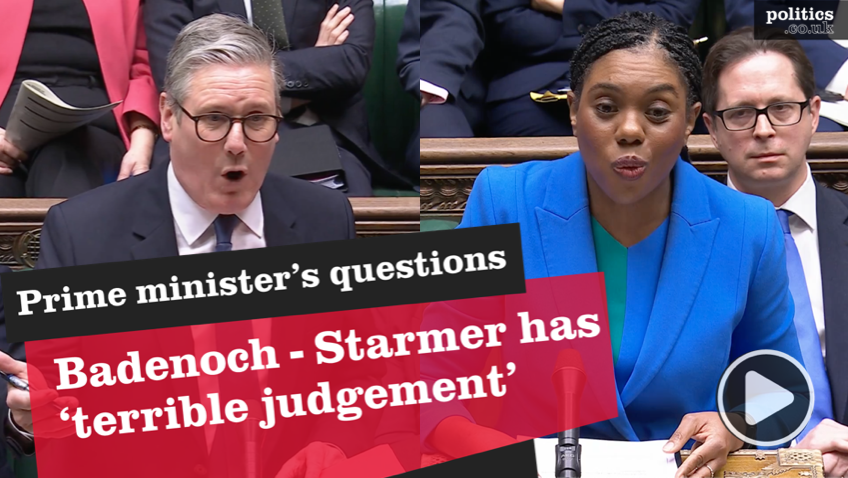Fat is a government issue
The politics.co.uk editor explains why the government has an interest in the nation’s waistbands. Disagree? Join in the debate
Obesity has been firmly adopted as a topic for government policy. Individuals are no longer able to claim their own expanding waistlines are a matter for personal concern, but instead find themselves written into increasingly alarmist reports of an “obesity epidemic” and the subject of government targets to slim down the nation.
The government insists this is not evidence of an emerging ‘nanny state’ – albeit one administering a spoonful of low-calorie sugar substitute. Being overweight, and in particular being obese, has become a byword for being unhealthy. The ‘pleasantly plump’ are no more and overweight people are increasingly stereotyped as greedy or lacking in self-control, with studies showing discrimination against fat people in the workplace.
Research does, however, bear out the claim that a person who is overweight to the point of obesity is more likely to suffer health problems. The World Health Organisation (WHO) cites evidence that the risk of chronic diseases increases progressively above BMIs of 21 – well within the healthy range of 18.5 to 25. WHO now regards raised body mass as a major risk factor for chronic diseases including cardiovascular disease, diabetes, musculoskeletal disorders and some cancers.


Burden on the NHS
For the government, this translates as an extra resources drain on the NHS, not to mention the loss of productivity if obesity-related health issues force people out of the workforce.
A 2004 report from the Commons health select committee estimated the annual costs of obesity at £7 billion. This in itself prompted the government to act, but recent estimates are more alarming. With obesity set to rise – up to 50 per cent of women and 60 per cent of men could be overweight by 2050 – the demands on the health service will become more pressing. In October 2007 a Foresight report warned obesity could cost the country £45 billion a year by 2050, with a £6.4 billion cost to the NHS vastly exacerbated by other costs including a loss of working time.
Fat and social class
In his first major speech as health secretary Alan Johnson committed himself to reducing obesity. He linked this to a wider commitment to reducing health inequalities, reflecting the deeply held belief that obesity is a socio-economic issue. Demographic research has found people are most likely to be overweight in northern industrial towns, which also tend to be the most economically deprived. By contrast the thinnest people are found in affluent boroughs in the south-east, with Kensington and Chelsea standing out as the spiritual home of the size zero.
In 2001 the government set itself the target of reducing health inequalities by ten per cent by 2010, measured by infant mortality and the gap between life expectancy. Mr Johnson reaffirmed this commitment in 2007 and linked obesity to reduced life expectancy; a 20-year-old who is obese can expect to lose ten years from their life. Mr Johnson argued lifestyle differences, including diet but also smoking and exercise, can account for as must as half of the health inequalities gap.
Underscoring the challenge facing the government, Mr Johnson recognised the myriad of factors that can incline people towards obesity: “If a person’s future looks grim, and the reflection in the mirror is unappealing – based on poor self image – then smoking, drinking or over-eating can seem ever more attractive. Although these habits lead to long-term problems, they can certainly provide temporary relief from boredom, frustration and distress.” This marks a departure from traditional analyses, which tend to attribute rising obesity to the greater availability of energy-dense food combined with increasingly sedentary lifestyles.
If the factors driving obesity are complex, the government’s response is even more challenging. Mr Johnson has recognised the government needs to get better at matching care to communities, with access to healthcare a crucial factor in health inequalities.
But, he stresses politicians must be cautious when advising people about their lifestyle: “Avoiding a hectoring tone is absolutely crucial.” As such, the government is concentrating its efforts on childhood obesity. Mr Johnson believes the government can only really instil a health approach in schools; “after that it is down to personal responsibility.”
Childhood obesity
While childhood obesity may increasingly dominant the headlines, studies have found parents are often poor at spotting obesity in their own children. In a bid to remedy this, the DoH has introduced the National Child Measurement Programme, coordinated with the Department for Children, Schools and Families. This measures all children when they start primary school and again in year six, identifying those at risk of obesity. Families can then be offered advice on popular lifestyles.
A high-profile government policy to reverse childhood obesity has been the school meals campaign, spearheaded by celebrity chef Jamie Oliver. This was introduced amid a raft of publicity, with minimum standards for healthy meals and a ban on high fat and sugar snacks.
Disappointingly for public health campaigners, enthusiasm for new healthier meals has been mixed – suggesting children are not as susceptible to healthy eating campaigns as Mr Johnson perhaps hopes. Ofsted has found new healthier meals are not popular with pupils, and warns the policy will have little impact if present tends continue. Mr Oliver has blamed the government for insufficiently funding the scheme.
The Liberal Democrats, however, accuse the government of railroading the reforms, thereby failing to win the support of children and parents. They found take-up of school meals in secondary schools has fallen by two-thirds in secondary schools and 60 per cent in primaries. Lib Dem schools spokesman David Laws says standards for healthier meals were introduced too quickly, were too inflexible and too little attention was paid to pupils and parents.
In attempting to improve the health of the nation, the government must therefore strike a cautious balance. People need access to information on what constitutes a healthy diet, with many also calling for better labelling on products to help consumers make informed choices. But an overly assertive anti-fat campaign risks sparking counterproductive resentment.
Debate: Obesity and public health












